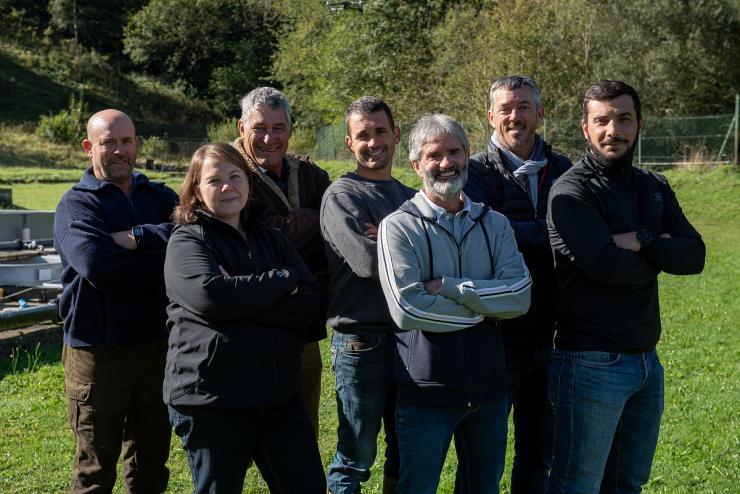
Food, Global Health Reading time 10 min
Lucie Marandel, an adept of basic research
Published on 29 November 2021
Understand. Understanding how life is formed, how an entire being is created from just two cells. What are the biological mechanisms that govern these processes? Lucie has built her professional life on the questions she had as a young girl, on her curiosity and her desire to understand even the smallest details of things. A "profession that is also a passion" in her own words. Resolute, patient and thorough, this young woman has all the qualities required to carry out research and do it well, fully convinced of the importance basic research has in advancing our understanding of the world around us.
Cows or fish? Genetics or epigenetics?
When she was small, she wanted to be a veterinarian. So she could care for animals? No, so that one day she could do research on production animals, with an already firm desire to go into basic research. A secondary school diploma in science, prépa (preparatory courses for entrance into one of France's grandes écoles), agricultural sciences school, an internship: her path was all laid out. Lucie wanted to study cows - her family home in the midst of Normandy probably played a role in that choice. The problem was that her bovine reproduction internship had to be cancelled. As every problem is also an opportunity, she found another internship...this time on fish! "I was not really drawn to fish before the internship but afterwards, I became enamoured with them since as a model there are so many things to be discovered!" So she began work on a thesis about goldfish at the Fish Physiology and Genomics Laboratory in Rennes. The goal: to understand how the genes involved in their embryonic development operate. After a post-doctoral fellowship in Belgium, Lucie was hired by INRAE in 2014 to join the Nutrition, Metabolism, Aquaculture (NuMeA) joint research unit. She made the recent field of epigenetics her focus area. But don't be mistaken, it's very different from genetics: "They are not at all alike. In genetics, you study the genome, the DNA sequences that make up genes, whereas in epigenetics, you look at the biological mechanisms that allow genes to be read, i.e. the factors that decide whether or not genes will be expressed. And diet plays a role in this type of regulation."
Welcome to a little-known area of research
Fish are a poorly known model, so the field is wide open for exploring lots of different things.
The ultimate aim of her research is clear: replacing, on farms, fish-meal and oil, which are not environmentally or ethically friendly since they come from overfishing, which depletes marine resources and causes pollution. But what could be used to replace them? While her colleagues were studying plant- or insect-protein-rich feed, Lucie decided to see what effect a high carbohydrate diet would have on trout. Such feed has the advantage of being low-cost and easy to produce in large quantities. This would involve ensuring optimal growth in the trout as well as their well-being and finding a balanced feed that did not waste protein resources. However, normally trout are poor users of this nutrient when large quantities of it are included in feed.
How could trout better assimilate carbohydrates? Does eating them change their metabolism and physiology? To answer such questions, Lucie looked at what goes on at the epigenetic level. When trout are fed more carbohydrates are fewer genes expressed? Or more? Or new ones? But before this could be studied, a full experimental design had to be set up.
Like a fish in water
Slide on your boots, put on a warm coat, we are going to Lées Athas, the INRAE site nestled in the Béarn Mountains, home to the fish farming facilities where the trials Lucie developed were carried out. Inside are tanks with young rainbow trout at various stages of development. Outside are big tanks with adult trout. Every day they were given feed whose formulation had been designed by her nutritionist colleague and which was produced at INRAE's experimental fish farms in Donzacq. "I don't know much about nutrition - it's real teamwork!" The fish were then observed at various stages of development to determine the effects of their new diet over time. Now we are back at Saint-Pée-sur-Nivelle, in the molecular biology and biochemistry laboratories where Lucie analysed the RNA extracted from trout liver and muscle cells, together with blood and epigenetic testing. Using the RNA, she was able to check whether new genes were being expressed or if some were no longer expressed. Results: two genes involved in glucose production by these cells were over-expressed in trout that had been fed carbohydrates as compared to control trout.
Programmed to eat differently
Her discoveries did not end there! With her characteristic perseverance, Lucie showed that when fish are very young, they can be "programmed" so that when they become adults, they assimilate carbohydrates better. Epigenetics could explain why. Feeding young fish carbohydrates at a very early stage may cause epigenetic changes that lead to the expression of genes that otherwise would not be expressed. Such changes are passed on during cell division, allowing adult trout to better use carbohydrate content. Even more surprising is the possibility that such traits could be passed on over several generations. "These trials are still undergoing analysis and I have plenty of other avenues I'd like to explore - I have at least another 10 years of research to do!"
INRAE: the freedom to carry out research
Without basic research, there would be no application
"Being a researcher at INRAE means having the freedom to carry out research using dedicated resources and facilities - having the freedom to carry out your work in the direction you want. For me, it's being able to engage in basic research while maintaining an agronomic dimension in my efforts. When I first came to INRAE, I didn't have any funding assigned to my projects and to get such funding, you have to publish. But the NuMeA unit's budgets are pooled, everyone consults on equipment purchases, which allows young researchers like me to begin work under good conditions."

An award?
"I am, of course, very honoured and surprised to receive this award, but I am especially pleased that this award is giving true recognition to the value of basic research in a targeted research institute. It's something I feel very strongly about as without basic research, there would be no applications.”
Mini-CV
37, in a civil union, 1 child
- Career
2014: Research scientist, NuMeA joint research unit (INRAE, University of Pau and Pays de l’Adour), INRAE Nouvelle Aquitaine Bordeaux Centre
2012 - 2014: Post-doctoral fellowship, Diagenode, Liège, Belgium. Marie Curie Fellowship, Initial Training Network INGENIUM. - Education
2011: PhD in Biology, Fish Physiology and Genomics Laboratory (LPGP), INRAE & University of Rennes. Characterisation of pou2, nanog, c-myc and sox2 genes during embryonic development in Carassius auratus.
2008: Agrocampus Rennes (Ecole nationale supérieure agronomique de Rennes)
2008: Master in Biology, Animal Physiology and Quality, University of Rennes - Hobby: walking.
